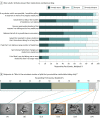Assessment of Attitudes Toward Deprescribing in Older Medicare Beneficiaries in the United States
- PMID: 30326004
- PMCID: PMC6583614
- DOI: 10.1001/jamainternmed.2018.4720
Assessment of Attitudes Toward Deprescribing in Older Medicare Beneficiaries in the United States
Abstract
Importance: Use of harmful and/or unnecessary medications in older adults is prevalent. This can lead to avoidable harms such as adverse drug reactions, falls, hospitalization, and mortality. Primary care physicians report that patient resistance to discontinuing medication use is a significant barrier to deprescribing.
Objective: To describe the attitudes of older adults toward deprescribing and to determine whether individual characteristics are associated with these attitudes.
Design, setting, and participants: For this population-based survey study of US Medicare beneficiaries 65 years and older, data were obtained from the Medication Attitudes module fielded through in-person interviews in round 6 of the National Health and Aging Trends Study (weighted response rate of round 6 was 88.5%). The questions in this module were drawn from the Patients' Attitudes Towards Deprescribing questionnaire and its revised version. The Medication Attitudes module was fielded to a random one-third (n = 2124) of the National Health and Aging Trends Study participants (weighted response rate of this module was 94.8%).
Main outcomes and measures: Responses to 2 statements ("If my doctor said it was possible, I would be willing to stop one or more of my regular medicines" and "I would like to reduce the number of medicines I am taking") were the main outcomes of interest.
Results: Of the 1981 Medicare beneficiaries included in the study, 1149 (55.2%, weighted) were women, and the majority (n = 715 [54.6%, weighted]) were 65 to 74 years old. A total of 1752 (92.0%, weighted) older adults reported being willing to stop taking 1 or more of their medicines if their physician said it was possible, and 1241 (66.6%, weighted) older adults wanted to reduce the number of medicines that they were taking. Older adults taking 6 or more medications had greater odds than those taking fewer than 6 medications of being willing to stop taking 1 or more of their medicines (adjusted odds ratio, 2.90; 95% CI, 1.74-4.82) and wanting to reduce the number of medicines that they were taking (adjusted odds ratio, 2.31; 95% CI, 1.71-3.13).
Conclusions and relevance: Physicians considering deprescribing as part of comprehensive, patient-centered care should be reassured that a majority of older Americans are open to having 1 or more of their medicines deprescribed if their physician says it is possible, and more than two-thirds want to reduce the number of medicines that they are taking.
Conflict of interest statement
Figures
References
-
- Elmståhl S, Linder H. Polypharmacy and inappropriate drug use among older people—a systematic review. Healthy Aging Clin Care Elder. 2013;5:1-8. doi:10.4137/HACCE.S11173 - DOI
Publication types
MeSH terms
Grants and funding
LinkOut - more resources
Full Text Sources
Other Literature Sources
Medical


